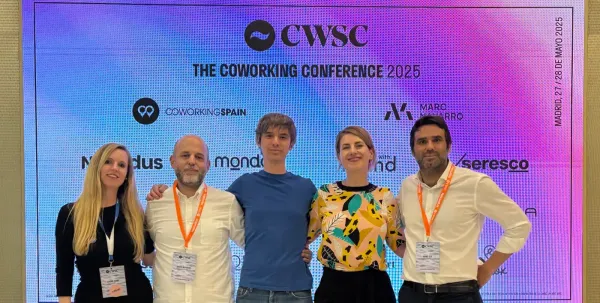📸 Special thanks to David Portnicki for the incredible photos!
Last week, coworking operators, researchers, and curious newcomers gathered for #Zukunftcoworking 2025, organized by the Bundesverband Coworking with Tobias Kollewe as curator and Prof. Dr. Axel Minten as host. The event was held in the heart of Köln, Germany 🇩🇪.
This one-day, one-stage conference was packed with insight, inspiration, and honest conversation. Let’s get into it:
Table of Contents
- Opening: The State of Coworking in Germany
- Coworking Compliance: A Crash Course
- Rethinking Office Work
- Fenyx – Sustainable Furnishing for Coworking Spaces
- Spaces Highlights
- Building the Future of Coworking
- The Best Part – Meeting You! + Gallery
- #Zukunftcoworking 2026 and the German Coworking Prize
The State of Coworking in Germany

The day began with a powerful statement from Bundesverband president Tobias Kollewe. In his opening session, fittingly titled ”Quo vadis, Coworking?”, he didn’t shy away from naming the challenges currently facing Germany’s coworking industry: rising costs, reduced demand for office space, and tighter budgets. He even reminded us of some painful closures of well-known spaces and coworking brands that shook us all this year.
The challenges were not presented to attract fear, but to unite us around the solutions. In the words of Tobias Kollewe:
“Coworking is a business.”
“A community is not just a nice-to-have, but a must.”
Tobias' words set the tone for a day focused on learning, resilience, and collaboration, and left us with a call to action. We need strong business plans, really carving out our spaces' unique selling points, and focusing on the community value we deliver. He sent us into the day with some interesting questions in mind: where does the coworking movement stand today, financially, culturally, and structurally? And what does it need to stay strong moving forward?
Coworking Compliance: A Crash Course
The morning continued with practical insights. Andreas Christ from H39 (which he proudly described as the smallest space in Germany) shared his story of being audited under the Geldwäschegesetz (German Anti-Money Laundering Law). A routine bureaucratic procedure that can happen to any Coworking Space in Germany.
After the initial panic, he took a deep breath, sat down, and methodically worked through the challenge — calmly gathering the documents and reaching out to the offices. In the end, H39 passed the audit easily – thanks to solid preparation, thorough documentation, and clever use of digital tools like Cobot.

Andreas turned his experience into a practical guide for other operators, which you can find here. If you’re looking for more resources, you can head over to our legal guides on Opening a Coworking Space or the one about Virtual Offices(also available in German 🇩🇪).
Rethinking Office Work
Stephan Holzbach from Seatsmatch led a session titled “The future of the office is human: working where it’s needed – across regions, flexibly, and connected”.
He showed that the modern office is no longer about location but about purpose and people. While 68% of European knowledge workers now work hybrid or remote, 82% still go to the office for personal connection.
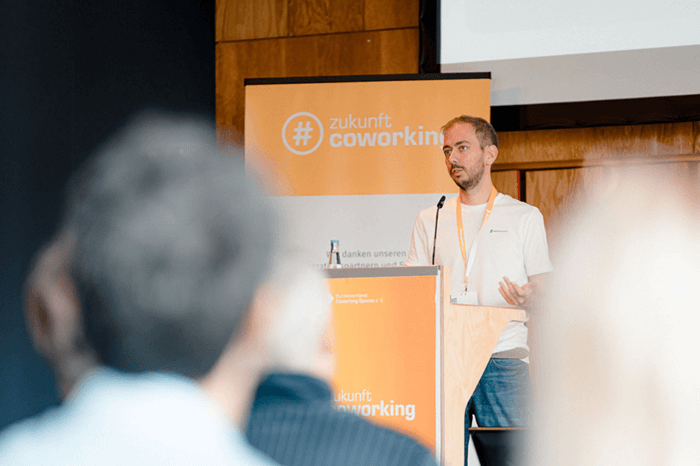
Data from Gallup’s 2024 Global Workplace Report reinforced that point:
- Remote workers report higher levels of loneliness than those on-site.
- Engaged employees, even remote ones, experience significantly less loneliness.
- Actively disengaged workers are the loneliest group.
Takeaway: The future of work isn’t about replacing offices but redefining them. Coworking spaces play a key role by combining flexibility, collaboration, and belonging.
Fenyx – Sustainable Furnishing for Coworking Spaces
Vincent Jahn from Fenyx shared how circular practices in furniture management can make coworking spaces both sustainable and financially efficient. With a network of more than 150 partners across Europe, Fenyx helps spaces reduce their environmental impact by repairing, refurbishing, reselling, or leasing furniture instead of producing new pieces.

The results speak for themselves:
- CIC: 105 refurbished chairs → 15,750 kg CO₂ saved → 50% cost savings
- The Delta Campus: 324 chairs → 21,096 kg CO₂ saved → 69% savings
- w3.hub: 200 refurbished setups → 30,690 kg CO₂ saved → 61% savings
Extending the life cycle of office furniture isn’t just good for the planet – it’s a practical way for coworking spaces to lower emissions and set-up costs.
Spaces, Spaces, Spaces!
Some of the most inspiring parts of the day came from space owners and operators sharing the honest stories and learnings behind their coworking journeys. Most of the spaces were Cobot customers. Here are the highlights:
COWOKI – Köln
Peggy Wahrlich, who runs one of the few coworking spaces in Germany that includes childcare, delivered one of the most powerful talks on the day. She founded Cowoki to challenge the persistent inequalities she saw every day: the gender pay gap, the gender pension gap, and above all, the gender care gap that affects many parents, especially women.
She spoke about how her vision was challenged in practice. After building a successful space and surviving the pandemic by adding private offices, Peggy partnered with a promising business ally who shared her values as well as her intent to scale Cowoki further. But just 2 months after starting the new company and the expansion, the partner withdrew from the project and their responsibilities without warning, leaving her to face debt, legal uncertainty, and months of rebuilding.

She spoke about what followed – navigating insolvency, uncertainty, and responsibility for her team. Through collective effort, they organized events, attracted new leads, and raised Cowoki’s revenue by 20% within three months. Peggy successfully reclaimed her coworking space, emerging with a clearer focus on community, transparency, and structure. Cowoki’s story shows that community is what can carry a space through its toughest times.
Das Wolf – Bad Soden-Salmünster
Joachim Schmidt presented the story of Das Wolf, a coworking space that brings the early spirit of Berlin’s coworking movement to a historic half-timbered house in Bad Soden-Salmünster.
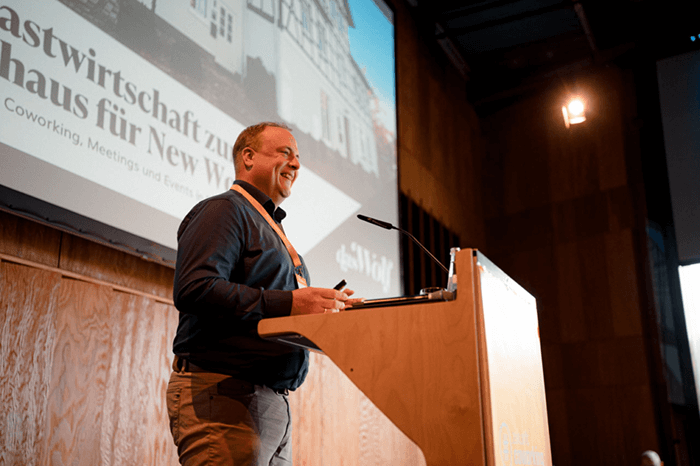
After years in Berlin, where he experienced firsthand the rise of coworking and new work culture, Joachim returned to his hometown to transform his family’s property into a place where people can work, create, and contribute to a more sustainable and human work culture. Together with Maike Ovens, he now runs Das Wolf as a calm, community-driven space.
V12 – Wiesbaden
Set in a beautifully restored villa, V12 is home to an ecosystem of architects, designers, and construction professionals. Founders Viet Anh Nguyen and Jessica Ferri are architects themselves. After years in large architecture firms, they decided to take a different path – founding their practice and creating a space where others in the industry could connect, share ideas, and grow together.

They led the renovation themselves, working closely with the Department for the Protection of Historical Monuments (Amt für Denkmalschutz). The results were absolutely worth it. Every detail in V12 tells a story of precision and care, from the preserved architecture to the thoughtful design that balances elegance with function.
We loved how intentionally their space reflects their community: refined, focused, and deeply collaborative.
Coworking Space Merzig – Merzig
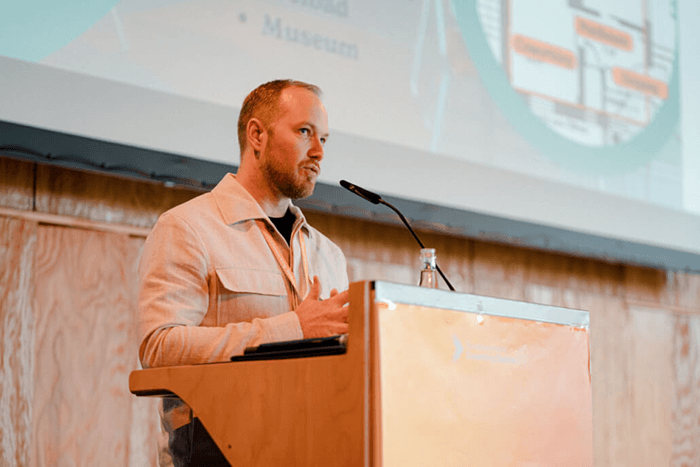
Serge Reger founded Coworking Space Merzig out of necessity. When he went looking for a flexible workplace solution in his region, he found there simply wasn’t one. Traditional office rentals were too rigid and expensive, and no coworking option existed for freelancers, startups, or remote workers nearby.
So, he decided to create one himself in a former fire engine depot. His goal was clear: to build a place that stands for efficiency, innovation, and networking, giving local professionals the flexibility and community they had been missing.
Visit Coworking Space Merzig | Instagram
werkhain – Berlin
Selina Schröter from Berlin-based Cobot customer werkhain brought a burst of energy to the stage with a talk on how design, values, and visibility helped them go from opening to fully booked in a matter of weeks.
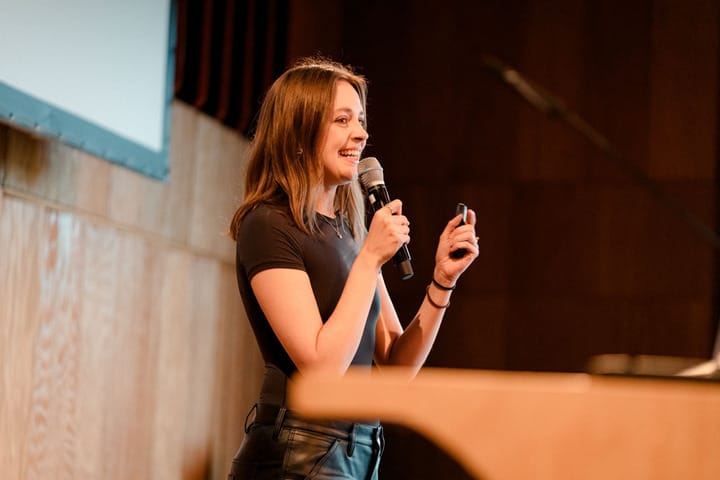
Winners of the 2025 German Coworking Award for Newcomer of the Year, werkhain embodies Berlin’s bold coworking spirit. In just eight weeks, the team transformed a former gym into one of the city’s most striking coworking spaces — a place to work, relax, and connect.
Selina shared their biggest lesson: a sharp focus on your target coworkers, fearless authenticity, and a marketing dialogue that is smart and honest make all the difference.
We couldn’t agree more — and can confirm from our experience, having held one of our big quarterly team gatherings there earlier this year.
Alsenhof – Lägerdorf
Heiko Kolz spoke about “Zukunftsorte im ländlichen Raum” – Future Places in Rural Areas. He began with a simple question: How do we want to live, learn, and work in the future? His goal, he said, is to bring together people from different professions, cultures, and generations.

At Alsenhof in Schleswig-Holstein, Heiko is creating exactly that kind of place. He highlighted how changing work trends open new opportunities for rural coworking: the growing desire for space and nature, the rise of remote work, and the shortage of affordable offices in cities. Together, these trends make rural areas valuable hubs for innovation, community, and sustainable growth.
Building the Future of Coworking
Cobot’s founder, Kristina Schneider, took the stage to share her vision for the future of coworking software and how Cobot’s roadmap evolves from the real needs of operators in Germany and beyond.
She started by providing background on one of our recent exciting updates: the completely new Cobot Members App for iOS and Android. Designed to make coworking simple and seamless, the app brings bookings and reservations straight to members’ pockets. Upcoming updates will include check-ins, time and guest pass management, event RSVPs, and a newsfeed, keeping coworkers connected to their space anywhere.

Kristina also gave a glimpse into ongoing improvements to Cobot’s admin portal, guided by two core ideas:
1. Cobot is the digital heart of your business growth.
Our dashboards and analytics are being redesigned to help teams make faster, smarter decisions, with the first updates rolling out this month!
2. With Cobot, you sell all your products on one single platform.
Kristina highlighted how Cobot has always supported every aspect of a coworking space’s product portfolio – and how we continue to expand flexibility for the products showing the most growth.
That’s why, in late 2025 and early 2026, you can expect much more flexibility for Teams and Offices, along with greater automation for Virtual Memberships. She also teased upcoming innovations, like smarter ways to manage mail and packages, and new tools that will make coworking products easier to find and explore.
Her talk was followed by a lively panel with Simeon Holtwiesche from anny, moderated by Prof. Dr. Axel Minten. The conversation explored topics like compliance, engaging features, and building future-proof tools that truly support operators.

The Best Part – Meeting You!
Apart from all the panels and talks, we want to share something personal.
Thank You! For trusting us, for coming to our booth to say hi, for using our product, and most importantly – for making coworking amazing! We can’t be more grateful to the wonderful community that we are a part of – and it’s always a very fun and special moment to meet Cobot users in person, to trade ideas, tricks, and learnings. We can’t wait to see you again!
-Laura, Aidan, Kristina, Thilo, and the entire Cobot team








The “zukunft” of #zukunftkoworking and German Coworking Prize 🏆
The event closed with the announcement that #zukunftcoworking will return on October 21st, 2026, in Köln – and with it, the German Coworking Prize 🏆
Curious about this year’s winners (including 6 Cobot spaces)? Check them out here.
We’re already excited to see all the innovative and unique spaces that will take the stage next year, and even more excited to reconnect with the coworking community that makes it all possible.
Til next time!

